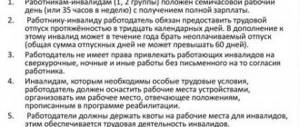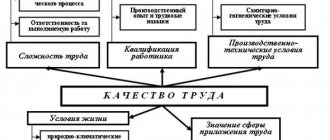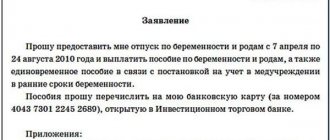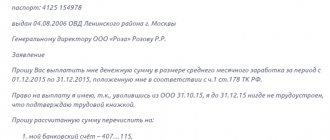An unsatisfactory state of the body is grounds for transferring an employee to a position with a smaller volume of work, and in the absence of such, termination of service in the internal affairs bodies. The level of incapacity for work is determined by the military medical commission (MMC); it establishes limited or complete unsuitability for service in the internal affairs department. The procedure for dismissal from the Ministry of Internal Affairs for health reasons, as well as the amount of payments and benefits in 2021, is strictly determined by special laws.
Persons due to dismissal from the Ministry of Internal Affairs for health reasons receive payments to military personnel and benefits from the municipal budget. The main condition for state support is a cause-and-effect relationship between the performance of official duties and the disease. In other words, if a police officer was seriously injured “at home” and was fired as a result, then he is not entitled to any money from the state.
Legislative regulation of the issue
Dismissal with compensation is regulated by the general norms of labor legislation. However, it has specific features and additional sources of regulation:
- Federal Law dated 02/07/2011 N 3-FZ (as amended on 12/05/2017) “On the Police”;
- Order of the Ministry of Internal Affairs of Russia dated September 3, 2007 No. 774 (as amended on October 3, 2012);
- Order of the Ministry of Internal Affairs of Russia dated November 1, 2008 No. 951;
- Labor Code of the Russian Federation dated December 30, 2001 N 197-FZ (as amended on December 31, 2017).
Additional regulatory support occurs at regional levels through local legislation. In the same way, the issues of what payments are due to a police officer upon dismissal for health reasons are regulated.
Insurance payments to employees of the Ministry of Internal Affairs and police in 2021
The original version of the project dated March 28, 1998 was changed several times. Contents Insurance payments to police officers are not due in every case of injury.
What cases are subject to compensation under compulsory insurance will be discussed in this section. Chapter 1 of Federal Law No. 855 provides a list of injuries and concussions, ailments and injuries that are subject to compensation: penetrating wounds of the skull; injuries to the chest and abdomen; bone fractures; damage to internal and genital organs; rupture of blood vessels; amputation of hands, limbs; dislocations of limbs ;tendon ruptures; multiple rib fractures; wounds causing the loss of a limb; facial disfigurement due to the removal of cartilage tissue; damage to the pharynx and larynx; damage to large vessels, nerve trunks; burns
List of diseases
If signs of illness are detected that prevent further service in the internal affairs department, the employee himself has the right to initiate his own dismissal. It is allowed only with a written conclusion of the IHC in the absence of the opportunity to get an “easier” job in the previous place.
There are several lists of diseases that imply varying degrees of disability and limited suitability for service. In this article we will consider only those that entail complete unsuitability and dismissal. These include:
- breathing pathologies;
- officially confirmed positive HIV status;
- neuropsychiatric disorders;
- diseases of the heart and blood vessels;
- persistent, progressive visual impairment;
- the presence of cancerous tumors;
- chronic pathologies of the genitourinary system;
- incurable bone defects resulting from injuries;
- STD;
- tuberculosis;
- deafness.
As a separate item, we will denote injuries received in connection with the performance of official duties, as well as diseases resulting from these injuries. For them, in addition to basic payments, the dismissed employee receives additional compensation from the state.
This list is exhaustive. The legislator did not provide for other diseases that completely deprive a citizen of the opportunity to perform further service.
The category of suitability for a number of certain diseases depends on the degree of their manifestation. If the symptoms are characterized by mild or moderate severity, the IHC may recognize the employee as partially fit for service. If illnesses such as tuberculosis and cancer occur, the sick person retains his job for 12 months.
As for the direct content of the medical report, it contains the following information:
- Full name, year of birth, position and special rank of the subject;
- date of entry into service;
- date of examination;
- diagnosis;
- the cause-and-effect relationship between the diagnosis and the performance of functional duties, if any;
- degree of suitability for service in a specific specialty;
- signature of the commission chairman and secretary.
Procedure
The presence of the disease in an employee can be determined during an annual medical examination, or during outpatient/inpatient treatment. It will not be possible to quit immediately after receiving a diagnosis, since there is a certain procedure for terminating service in the police department.
- Submitting a report . The report is submitted to the management of the unit one month before the proposed dismissal.
- Passing the VVK . The employee is required to undergo a medical examination confirming the presence of the disease. Based on the results of the examination, a conclusion is drawn up, which contains the formulation of the diagnosis and an assessment of the possibility of further service. The conclusion is transmitted to the police department at the employee’s place of duty.
- Drawing up a written notice. HR employees draw up a written notice containing references to the results of the medical examination as the reason for termination of the contract.
The notification is sent to the employee personally, or by a certified letter against receipt. If the notice is sent by mail, then the personnel service is required to draw up a report indicating the reason for sending by mail. Also, a report is drawn up in the event of an employee’s refusal to sign the notice.Important! The notice is given one month before the date of termination of the contract. Time is given to appeal the decision on termination in court and other authorities.
- Conducting a conversation with the department's management. After the notification is issued and signed by the employee, the head of the department conducts a mandatory conversation with him. The purpose of such a conversation is to find out some information:
- the employee’s living and family conditions;
financial situation of the family.
- Issuing a dismissal order. A dismissal order is issued, which must contain the following data:
- name of the police department;
employee details (passport, full name);
- date of admission to the staff, position, rank;
- information about the reasons for termination of service in the police department;
- references to the legislation in accordance with which dismissal occurs;
- link to the conclusion of the IHC and its details;
- established benefits, compensation payments;
- date of dismissal from position.
Submission of a report is required only in case of dismissal at the initiative of the employee himself.
In addition, the manager explains what benefits, payments or allowances the employee is entitled to, specifies the amount of compensation, etc. The results of the conversation are also documented in writing and attached to the dismissal person’s personal file.
The order is signed by management and handed over to the employee for signature. Appropriate entries are made in the personal file and work book indicating:
- reasons for termination of the contract;
- details of the dismissal order;
- details of the IHC conclusion;
- references to regulations.
We talked in more detail about the procedure and features of dismissal of military personnel for health reasons in this material.
Privileges for a military man
Upon dismissal due to general illnesses that are not a consequence of the performance of official duty, an employee of the Ministry of Internal Affairs receives:
- salary for the last month;
- compensation for unused vacation;
- cash bonuses, if any, were accrued but not paid;
- a one-time benefit in connection with length of service (if at the time of dismissal the employee served in the Ministry of Internal Affairs for 20 years or more, he is paid 7 salaries, and if the service is less than 20 years - 2 official salaries).
If harm to health is received as a result of a “work-related injury,” which is proven by the conclusion of the Internal Military Commission, then in addition to the specified allocations, the victim is entitled to:
- one-time compensation in the amount of 2 million rubles;
- monthly payments to military personnel upon dismissal in the event of disability.
The subsidy is maintained for 1 year from the date of dismissal and increases in the same way as regular salary increases for working colleagues.
In both cases, an employee of the Ministry of Internal Affairs, upon dismissal for health reasons, is entitled to insurance payments upon dismissal from the police. Since the health and life of a police officer are subject to compulsory state insurance at the expense of budgetary funds.
Dismissal from the police due to poor health does not imply payments in favor of the dismissed person.
Job retention
In some forms of the disease, it is possible not to resign, at least while completing the mandatory stage of treatment.
For example, early stage cancer or tuberculosis are completely curable if detected at the very beginning of development.
The law allows treatment for one year without losing the opportunity to return to your duty station. Based on the results of drug intervention, the employee has the right to either return to his duties without having any more health problems, or resign and become disabled.
Attention!
- Due to frequent changes in legislation, information sometimes becomes outdated faster than we can update it on the website.
- All cases are very individual and depend on many factors. Basic information does not guarantee a solution to your specific problems.
That's why FREE expert consultants work for you around the clock!
- via the form (below), or via online chat
- Call the hotline:
- 8 (800) 700 95 53
APPLICATIONS AND CALLS ARE ACCEPTED 24/7 and 7 days a week.
Labor law
Benefits upon dismissal
In addition to the compensation already mentioned, officers who have suffered harm to health in connection with the performance of official duties are entitled to the following benefits:
- one-time payments upon dismissal from the Ministry of Internal Affairs for health reasons in the amount of 1.5 million rubles upon receipt of the first group of disability, 1 million rubles for the second group, 500 thousand rubles for disabled people of the third group;
- the right to occupy a vacant position in government bodies, provided that it corresponds to the specialty and qualifications of the former employee;
- children of discharged military personnel are given a quota at the preschool educational institution at the place of registration without waiting in line.
There are no special benefits for employees injured in the line of duty or dismissed due to a general illness.
Reasons
Workers in various fields are fired for a variety of reasons, for example:
- At the personal request of the employee. Each person has the right to decide for himself who to work for and for what money, so it is considered normal to look for exactly the place where it would be convenient and comfortable to work and get decent money.
- At the initiative of the employer. The employer is satisfied with the employee when all orders are followed, discipline is not violated and efficiency increases. If there is any dissatisfaction with the employee, then the head of the office has the right to “ask” the unwanted employee, on the basis of one of the articles of the Labor Code of the Russian Federation.
- Due to inconsistency with the position held. These reasons include both illness incompatible with the position and occupation. unpreparedness.
Documentary evidence must be created for each basis. If the initiative to terminate the contract comes from the employee himself, then the main form will be an application (report). In case of health problems during the dismissal process, papers from doctors must be prepared.
Payments for military injury in the Ministry of Internal Affairs in 2021
• the serviceman committed a socially dangerous act that led to damage to health; • alcohol or drug intoxication contributed to injury or injury; • intentional harm caused to one's health has been established. The above reasons for refusal to pay are determined exclusively in court.
One-time compensation payment.
The one-time compensation that is due to a serviceman (officer, midshipman or warrant officer) is paid after representatives of his part send the necessary package of documents to the appropriate organization that has entered into an agreement with the military department. The package includes the following documents: a statement of the established form, which is written by a military personnel.
Lost earnings
An employee dismissed due to a military injury has the right to receive compensation for lost earnings. It is prescribed to pay one-time benefits to contract in the amount of two million rubles, and to conscripts and participants in military training - one million rubles.
Let's find out how to register an inheritance for an apartment after the death of a person.
What article of punishment of the Criminal Code of the Russian Federation threatens for forging a signature, we will consider in our article.











